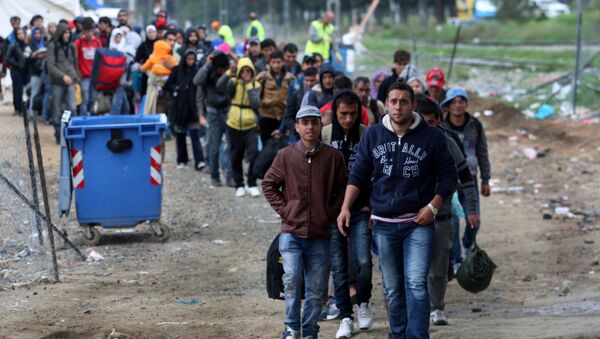EU migration commissioner Dimitris Avramopoulos refused to directly answer a question over the return of migrants who had traveled from Greece to other EU countries back to Greece under the Dublin agreement — whereby migrants must be processed in the country of first arrival — saying only that "the situation will be smoother in the future."
In May and September of 2015, the European Commission published its roadmap for migrants allowing for the relocation of 160,00 migrants who had turned up in various countries — notably Greece, Italy and Hungary — amid the chaos of mass movement and inadequate border controls. These migrants would be 'processed' and then redistributed around EU member states according to an "emergency" plan a mandatory quota system.
In the past two weeks, 1.135 #migrants have been rescued & 102 bodies were retrieved off #Libya'n coast @IOM_Libya pic.twitter.com/r62DtAJqRA
— UNSMIL (@UNSMILibya) 3 March 2017
The plan was supposed to have relocated the migrants within two years — by September 2017 — but only 13,574 have, so far, been relocated out of Greece and Italy, according to the latest figures (March 2). Many member states are opposed to the mandatory quota system, with Austria, Hungary and Poland refusing to take any.
Meanwhile, migrants who had made their way to other member states were supposed to be returned back to Greece for processing, under the Dublin agreement, as they had not originally been processed there. However, that scheme has also run into difficulties — not least because of opposition from human rights groups.
Amnesty International has criticized the 'Dublin returns' policy, because conditions in migrant camps in Greece are already inhumane, largely because of the numbers being detained in them pending their return to Turkey, under the controversial EU-Turkey migrant deal.
"It seems that for the European Commission all roads for refugees lead to Greece. It is outrageously hypocritical of the European Commission to insinuate that Greece alone is to blame for dire conditions, when the overcrowding and insecure climate on the Greek islands are for the most part caused by the EU-Turkey deal, and compounded by the lack of solidarity from other EU countries to relocate people," said Iverna McGowan, Director of Amnesty International's European Institution's Office.
Amnesty lashes at “hypocrisy of EU Commission” for cruel migration detention regime https://t.co/2XBoUXSBqA #news via @New_Europe pic.twitter.com/VdfAhMBFjX
— New Europe (@New_Europe) 3 March 2017
When pressed on the issue, EU migration commissioner Dimitris Avramopoulos told EU Observer: "There are no excuses or pretexts anymore, I believe that all member states will decide to do their duty as I said and the situation will be smoother in the future".
Dublin transfers to Greece from other Member States have been suspended since 2011 following two judgments of the European Court of Human Rights (ECHR) and the Court of Justice of the European Union (CJEU) which identified systemic deficiencies in the Greek asylum system.
In December, the Commission said that "significant progress has been achieved by Greece in putting in place the essential institutional and legal structures for a properly functioning asylum system" and that returns would begin March 15, 2017. However, Avramopoulos's remarks indicate the plan may, once again, fail to materialize.






